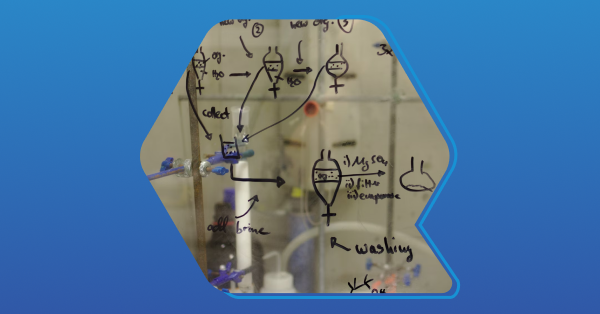LIMS vs. LIS: Which is Right for Your Lab?

ELN, QMS, LIMS, LIS… do you really need all of these software platforms to run your lab efficiently?
If you don’t want to scramble through endless spreadsheets or track down paper records the second an auditor plans to visit, yes, you’ll need at least one of them.
But which? The last two on the list cause a great deal of confusion for lab managers: LIMS (Lab Information Management Systems) and LIS (Lab Information Systems). Just one word/letter of difference: management.
In this article, we’ll break down how a LIMS and LIS differ, which types of labs they are best suited for, and how to decide which to choose for your lab.
What is a LIMS
A LIMS is a comprehensive software platform designed to manage and track samples, tests, and results throughout the entire lab workflow.
LIMS are information management and automation powerhouses for modern labs. They also come in a variety of forms:
- They can be built from scratch and self-hosted or licensed
- You can host them yourself (on-prem) or access them via the cloud
- Some require heavy customization to make changes, while others offer in-app configuration
- Some are industry-agnostic, while others are industry-specific
- Some are enterprise platforms with pro services, while others are self-service
Many labs, from biotech to food and beverage, use a LIMS to manage inventory, automate processes, and even support billing and invoicing. But that’s just scratching the surface; some of the top features of a LIMS include:
- Sample management and tracking
- Workflow automation and optimization
- Instrument integration and data capture
- Quality control and assurance
- Reporting and data analysis
- Chain of custody management
- Reagent/kit lot tracking
- COA generation
- Batch test runs (and re-runs)
- Barcode scanning
The list goes on and on. Unlike a LIS (which we’ll cover below), a LIMS is sample-centric. Everything in a LIMS revolves around samples and inventory as they enter and move through your lab.
Without a LIMS, labs often manage the above functions and more manually, usually in a mix of spreadsheets and physical lab notebooks. The latter of the two can be especially problematic, as was the case for a lab we spoke with recently.
A cosmetics lab we spoke with used a system of 4x6 notecards and paper notebooks to manage all of their data. Auditors refused to so much as handle the documents, going so far as to call them “disgusting” and demand digital copies.
This lab experienced the following, thanks to these manual systems:
- Difficulty in digital audit preparation and compliance.
- Inability to manage or access data remotely or efficiently.
- A lack of digital training/document storage for employees.
- The absence of standardized, automated, and easily accessible workflows.
- Difficulty in assigning and tracking tasks and approvals.
Fortunately, this is exactly what a LIMS helps with. Thanks to automated data capture, compliance controls, and automation, the right LIMS can be a source of truth and a major asset for any modern lab.
So what’s a LIS? We’ll answer that next.
What is a LIS
LIS stands for “Laboratory Information System.” The only word missing from the name is “management,” so how different could these platforms be?
It turns out, by quite a lot.
A LIS is a specialized software platform primarily used in medical and clinical laboratories. Unlike a sample-centric LIMS, a LIS is patient-centric; a LIS is designed to manage patient data, test orders, and results, ensuring seamless integration with Electronic Health Records (EHR) systems.
Like a LIMS, a LIS stores and manages information for a lab. However, a LIS is specialized to store:
- Patient data management
- Test ordering and scheduling
- Results reporting and delivery
- Billing and insurance processing
- Compliance with regulatory standards (e.g., HIPAA, CLIA)
- Clinical reporting workflows
- Support for toxicology, pathology, or diagnostic needs
While both a LIMS and a LIS are helpful, a LIS plays an important role in streamlining medical lab workflows, enabling faster and more accurate diagnoses and treatment decisions.
LIMS vs. LIS: When Do You Need One?
It depends on what type of lab you run and the type of information you need to store.
We recommend you consider a LIMS if your lab if you:
- Handle a diverse range of sample types and testing methodologies
- Require extensive customization and flexibility in workflow management
- Deal with complex regulatory compliance requirements (e.g., FDA, EPA)
- Need advanced data analysis and reporting capabilities
For example, an environmental testing laboratory would want to use a LIMS to track water samples from collection to reporting. This allows them to manage sample data, automate their workflow, integrate with analytical instruments, and generate compliance reports.
On the other hand, a LIS is the better choice if your lab if you:
- Primarily focus on healthcare-related patient testing and results delivery (often at lower volumes)
- Require seamless integration with EHR systems and other healthcare IT infrastructure
- Deal with highly standardized testing procedures
- Must comply with strict medical data privacy and security regulations
For example, a hospital clinical laboratory would want to use a LIS to manage patient blood tests. The LIS can receive test orders from the hospital, track samples through the testing process, automatically report results back to patient records, and alert physicians of critical values.
Here’s a side-by-side comparison to help make your decision.
Can You Use a LIMS Instead of a LIS, or Vice Versa?
Obviously, if you are a water testing lab or materials testing lab, a LIMS is the superior choice. But for clinical labs, should you purchase a LIMS, a LIS, or both?
If you’re still caught between the two, we recommend you consider the following:
- Need: Beyond storing patient/test/sample information, what else does your lab need to do? For instance, do you need to run reports or automate processes? Perhaps you may need to provide an external portal for customers or patients to log into. If your lab has a more diverse set of needs, then a LIMS may be a better fit.
- Budget: As with any software, you should consider the costs of implementing and maintaining the platform you choose.
- Scalability: While your lab may have a specific set of needs now, do you anticipate them changing in the future? While it’s impossible to anticipate every future need, you should make sure that the platform you choose today does not limit you tomorrow (or within the next year).
What to Look for When Choosing a LIMS
If you’re not a clinical lab, then a LIMS is the platform for you. So, of the dozens of vendors across industries and price ranges, which will you choose?
Industry-specific vendors? Customizable platforms? Self-hosted systems for maximum control?
- Complexity vs Simplicity: LIMS are sophisticated platforms, but that doesn’t mean they need to be complex. We recommend prioritizing ease of use and support quality; otherwise, you may be locked into an uphill battle with your LIMS.
- It’s also worth noting that some LIMS vendors staff their customer-facing teams with experienced lab professionals who understand the needs of modern labs rather than just providing tech support. Pay attention to the support staff's qualifications as much as to their hours and availability.
- Configurable, not customizable: Customizable LIMS require custom code to make changes – this sounds great in theory; in practice, it can result in thousands of dollars spent for even minor changes and weeks of waiting and testing. Meanwhile, a configurable LIMS like QBench allows you to make changes in-app to adapt the platform to your needs.
- Industry-agnostic vs industry-specific: Industry-specific LIMS may be created with your needs in mind, but they can be rigid and are often more expensive than industry-agnostic solutions that can adapt to your needs and workflows.
We cover this in-depth in our guide to choosing the right LIMS for a full walkthrough of the above and more.
New to LIMS? Download our LIMS Buyer’s Guide
Between implementation, training, and adoption, the switching costs of software for your lab can be high.
That’s why it’s so important to make an informed decision. A LIMS is an extremely powerful tool for modern labs, but only if it’s the right tool for your use case and needs. If you’re still on the fence about choosing a LIMS for your lab or are new to this space, then check out our LIMS Buyer’s Guide.
Fill out the form below to download it and learn about the different types of LIMS, what features to look for, and how to make the right choice for your lab.






